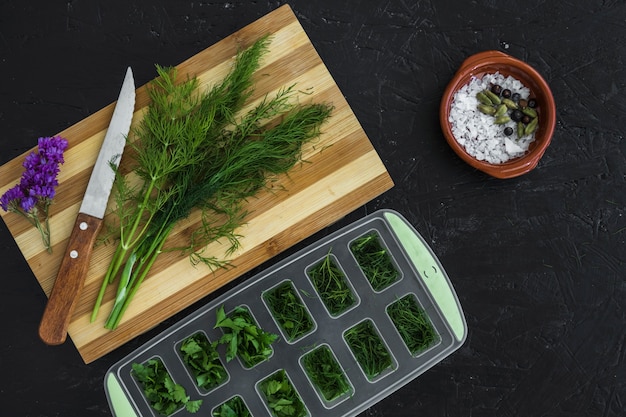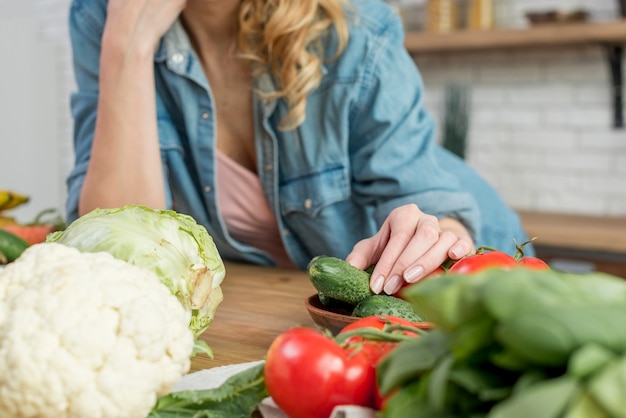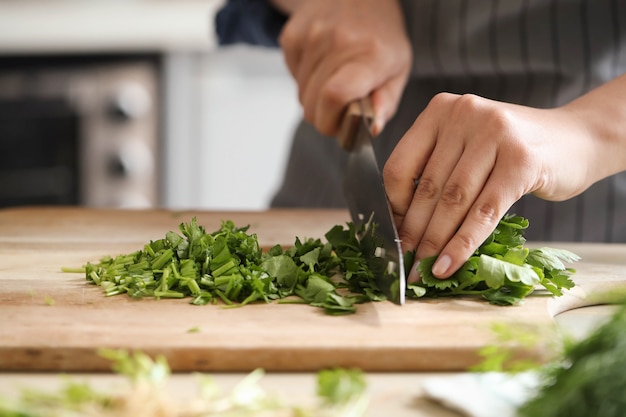(Part 1) The Wonderful World of Greens

A green glossary: Unveiling the Leafy Landscape
Forget the days of bland salads! There's a whole cast of characters in the leafy green world, each with its unique personality and flavour profile. Let's explore some of the most popular options:- Spinach: The classic, a true chameleon of the green world! Mild, versatile, and cooks quickly, making it perfect for everything from smoothies to pasta dishes.
- Kale: This robust leafy green has a slightly bitter edge and a firm texture that holds up well to cooking. Think braised kale, roasted kale chips, or even kale pesto! It's a real nutritional powerhouse.
- Chard: Closely related to kale but with a touch of sweetness, chard brings a vibrant colour and earthy flavour to your dishes. Try it in stir-fries, soups, or even stuffed into pasta parcels.
- Arugula: This peppery green is a favourite for adding a zing to salads, sandwiches, and pizzas. It's a great way to add a bit of spice to your meals.
- collard greens: These sturdy greens have a deep, earthy flavour and a slightly chewy texture. Think Southern soul food classics like collard greens with smoked ham hock.
- mustard greens: With their slightly spicy kick, mustard greens are a delight in stir-fries, salads, or even as a side dish with grilled meats. They add a punch of flavour and a touch of heat.
The Art of green storage: Keeping Those Leafy Beauties Fresh
No one likes limp, wilted greens, so let's make sure they stay fresh and vibrant. Here's my tried and true method:- Wash and Dry Gently: First, give those greens a gentle wash in cold water. Avoid soaking them, as this can make them limp. Pat them dry thoroughly with a clean tea towel.
- Wrap 'em Up: Wrap your dried greens in paper towels or a clean kitchen cloth. This helps absorb excess moisture and prevent wilting.
- Refrigerate Wisely: Store your greens in a plastic container or reusable bag in the crisper drawer of your fridge. Make sure they have room to breathe – overcrowding can speed up spoilage.
preparing greens: The Foundation for Success
Now that you've chosen your greens and stored them properly, it's time to get them ready for the spotlight. Here's my step-by-step prep guide:- Say Goodbye to Stems: For most greens, you'll need to remove the tough stems. Grab the stem at the base and pull it away from the leaves.
- Chop or Tear? You Decide: Once the stems are gone, it's time to chop or tear those greens. I often tear them as it preserves their natural texture.
- Rinse and Dry Again: After chopping or tearing, give those greens another quick rinse in cold water and pat them dry with a clean tea towel.
(Part 2) Cooking Greens to Perfection

The Sautéing Symphony: Quick and Delicious
Sautéing is the fastest and easiest way to cook greens, and it's a fantastic way to showcase their vibrant colours and delicate flavours. Here's my tried-and-true method:- Heat Your Pan: Start by heating a good quality pan over medium heat. I love my trusty cast-iron pan, but any sturdy pan will do.
- Fat is Your Friend: Add a generous amount of butter, olive oil, or a combination of both to the pan. Don't be shy! It helps create a delicious, buttery flavour.
- Add the Greens and Stir: Add your greens to the hot pan and stir them continuously. You'll see them wilt and become tender in just a few minutes. Don't overcook them – you want them to retain their vibrant colour and delicate texture.
- Season and Serve: Once the greens are cooked, season them with salt and pepper to taste. Get creative with seasonings like garlic, lemon juice, a pinch of nutmeg, or even a sprinkle of red pepper flakes for a little heat.
The Braising Method: Bringing Out Deep Flavours
Braising is a wonderful way to coax out the deepest flavours of your greens and create a hearty, comforting dish. It's especially good for tougher greens like kale and collard greens.- Aromatic Base: In a dutch oven or large pot, sauté onions, garlic, and any other aromatics you love. This will create a rich base for your greens.
- Greens Go In: Add your greens to the pot and stir them to coat them with the aromatics and oil. Add a splash of broth or water if needed.
- Low and Slow: Bring the pot to a simmer, cover it with a lid, and cook the greens over low heat for about 30-45 minutes, or until tender. Stir them occasionally to prevent sticking.
- Finishing Touches: Once the greens are tender, season them with salt, pepper, and any other herbs or spices you fancy. A splash of vinegar or lemon juice adds a tangy kick.
Roasting Greens: A Simple Yet Delicious Technique
Roasting brings out the natural sweetness of greens and creates a beautifully crispy texture. Here's how to achieve roasting perfection:- Prep Those Greens: Wash, dry, and chop or tear your greens. Toss them with olive oil, salt, and pepper. You can also add other seasonings like garlic, onion, or herbs.
- Bake to Perfection: Spread the greens in a single layer on a baking sheet. Roast them in a preheated oven at 400°F (200°C) for about 15-20 minutes, or until they're tender and slightly crispy. Keep a close eye on them – they can burn easily!
- Finishing Touches: Once the greens are roasted, you can serve them as is, or toss them with lemon juice, balsamic vinegar, or other seasonings.
(Part 3) Recipes for the Green Enthusiast

Spinach and Ricotta Gnocchi
This creamy gnocchi dish is a real crowd-pleaser. The ricotta adds a touch of decadence, and the spinach provides a healthy dose of nutrients.
Ingredients:
- 1 pound potatoes, peeled and cubed
- 1 cup ricotta cheese
- 1 cup grated Parmesan cheese
- 1 cup fresh spinach, chopped
- 1 egg
- 1/2 cup all-purpose flour, plus more for dusting
- 1/4 cup butter
- Salt and pepper to taste
Instructions:
- Boil the potatoes until tender. Drain and mash them until smooth. Let them cool slightly.
- Combine the mashed potatoes, ricotta cheese, Parmesan cheese, spinach, egg, and flour in a large bowl. Mix well until a dough forms.
- Dust a work surface with flour. Roll the dough into a long log, about 1 inch thick. Cut the log into 1-inch pieces.
- Bring a large pot of salted water to a boil. Drop the gnocchi into the boiling water and cook for about 3 minutes, or until they float to the surface. Drain the gnocchi and toss them with melted butter, salt, and pepper.
Kale Salad with Lemon-Mustard Vinaigrette
This vibrant salad is bursting with flavour and texture. The kale gets a little massage to soften it, and the lemon-mustard vinaigrette adds a bright, tangy punch.
Ingredients:
- 1 bunch kale, stemmed and chopped
- 1/4 cup olive oil
- 2 tablespoons lemon juice
- 1 tablespoon Dijon mustard
- 1 teaspoon honey
- Salt and pepper to taste
- 1/2 cup crumbled feta cheese (optional)
- 1/4 cup toasted pine nuts (optional)
Instructions:
- In a large bowl, massage the kale with a small amount of olive oil. This helps to soften the leaves and make them more tender.
- In a separate bowl, whisk together the remaining olive oil, lemon juice, Dijon mustard, and honey.
- Pour the vinaigrette over the kale and toss to coat.
- Top with feta cheese and toasted pine nuts, if desired.
Roasted Collard Greens with Garlic and Smoked Paprika
This roasted collard green dish is smoky, flavorful, and satisfying. The garlic and smoked paprika add a deep, complex flavour to the greens.
Ingredients:
- 1 bunch collard greens, stemmed and chopped
- 1/4 cup olive oil
- 2 cloves garlic, minced
- 1 teaspoon smoked paprika
- Salt and pepper to taste
Instructions:
- Preheat oven to 400°F (200°C).
- In a large bowl, combine the collard greens, olive oil, garlic, smoked paprika, salt, and pepper. Toss to coat.
- Spread the greens in a single layer on a baking sheet.
- Roast the greens for 20-25 minutes, or until they're tender and slightly crispy.
(Part 4) Exploring the World of Greens Beyond the Basics
Greens Beyond the Salad Bowl: Unleashing Culinary Creativity
Greens are so much more than just a salad base! They can add texture, flavour, and nutritional punch to countless dishes. Here are a few ideas to spark your imagination:- Smoothies: Blend greens into your morning smoothie for a boost of vitamins and minerals. Try spinach, kale, or even a handful of romaine lettuce. The greens will be practically invisible, but their flavour and nutritional benefits will shine through.
- Soups: Add greens to soups for a nutritious and flavourful base. Spinach soup is a classic, but you can also use kale, chard, or even a mix of greens for a vibrant green soup.
- pasta dishes: Toss greens into pasta dishes for a burst of freshness and colour. Spinach and ricotta pasta is a favourite, but you can also use kale, chard, or even arugula for a peppery kick.
- Quiches and Frittatas: Incorporate greens into your favourite quiche or frittata recipe. They add a vibrant colour and a delicate flavour to these egg-based dishes.
- pizza toppings: Use greens as a creative pizza topping for a healthy twist. Spinach, arugula, and kale are all great choices for adding a touch of green to your pizza.
- Burgers: Add greens to your burger patties for a nutritional boost and a unique flavour. Spinach and kale are popular additions, but you can also experiment with other greens like chard or mustard greens.
- Wraps and Sandwiches: Wrap greens around your favourite fillings for a delicious and healthy lunch or snack. Lettuce is a classic for wraps, but you can also use spinach, kale, or even collard greens for a more robust wrap.
The Power of Pickling: Transforming Greens into Tangy Delights
Pickling is a fun and delicious way to transform greens into tangy side dishes or snacks. Here are some ideas:- Pickled Spinach: A refreshing and tangy treat that's perfect as a side dish or a topping for sandwiches.
- Pickled Kale: Surprisingly delicious, pickled kale adds a tangy punch to grilled meats or salads.
- Pickled Mustard Greens: A spicy kick that's perfect for adding a bit of heat to your meal.
Making the Most of Leftovers: Creative Green Recipes for Second Helpings
We've all been there – a leftover bunch of greens staring back at us from the fridge. But instead of letting them go to waste, turn them into something delicious! Here are a few ideas:- Green Frittata: Whip up a quick and easy frittata with leftover greens, cheese, and eggs. It's a great way to use up any leftover greens and a hearty, satisfying meal.
- Green Soup: Puree leftover greens into a smooth and creamy soup. You can add broth, cream, or even a bit of spice to your soup.
- Green Pesto: Blend leftover greens with nuts, cheese, and olive oil to make a vibrant pesto. Use it on pasta, pizza, or as a dip for bread.
- Green Tacos: Wrap leftover greens around your favourite fillings for a healthy and delicious taco. You can use spinach, kale, or even collard greens for a hearty, satisfying taco.
- Green Salad: Combine leftover greens with other fresh ingredients for a refreshing salad. Add some chopped nuts, dried fruit, or a drizzle of vinaigrette.
(Part 5) Greens and Nutrition: Fueling Your Body with Nature's Bounty
The Nutritional Powerhouse of Greens
Greens are a true nutritional powerhouse, packed with essential vitamins, minerals, and antioxidants that are good for your overall health. Here are just a few of the key nutrients found in greens:- Vitamin A: Important for healthy vision, skin, and immune function.
- Vitamin C: An antioxidant that helps protect your cells from damage.
- Vitamin K: Essential for blood clotting and bone health.
- Calcium: Important for strong bones and teeth.
- Iron: Helps carry oxygen throughout your body.
- Fiber: Keeps you feeling full and helps with digestion.
- Antioxidants: Help protect your body from damage caused by free radicals.
Eating Greens for a Healthier You: Tips and Tricks
Here are some tips for incorporating more greens into your diet for a healthier you:- Start Small: Don't try to overhaul your diet overnight. Start by adding a small portion of greens to your meals each day. You can gradually increase the amount as you get used to it.
- Get Creative: Try different types of greens and experiment with different cooking methods to find what you enjoy. There's a world of flavour and textures to explore!
- Make it Easy: Keep pre-washed greens in your fridge for easy access. You can also chop greens in advance to save time during the week.
- Make it Fun: Get your kids involved in preparing greens. Let them help you wash, chop, or toss them with seasonings.
- Enjoy the Benefits: Greens are good for you, so enjoy them without guilt! They can be a delicious and nutritious part of a healthy diet.
(Part 6) The Green Movement: From Farm to Table
Supporting Local Farmers and Sustainable Agriculture
I'm a firm believer in supporting local farmers and sustainable agriculture. Choosing greens from local sources not only guarantees fresher produce but also contributes to a more sustainable food system. Here are some ways you can support local farmers:- Visit Farmers Markets: Farmers markets are a great way to connect directly with farmers and purchase fresh, seasonal produce.
- Join a Community Supported Agriculture (CSA) Program: CSAs allow you to subscribe to a weekly box of fresh produce from a local farm.
- Shop at Local Grocery Stores: Many grocery stores now carry produce from local farms. Look for labels that indicate the origin of your greens.
Understanding Sustainable Practices: Greens That Are Good for the Planet
When you choose greens from sustainable farms, you're supporting practices that are good for the environment and for future generations. Here are some key sustainable practices:- Organic Farming: Organic farms use natural pest control methods and avoid synthetic fertilizers and pesticides.
- Regenerative Agriculture: Regenerative farming practices focus on improving soil health and biodiversity.
- Water Conservation: Sustainable farms use water-efficient irrigation techniques to minimize water usage.
- No-Till Farming: No-till farming reduces soil erosion and improves soil health by avoiding tilling the land.
(Part 7) Greens and the Culinary World: A Global Perspective
Greens Around the World: Culinary Traditions and Flavour Profiles
Greens are a staple ingredient in cuisines around the world, each region showcasing unique ways to prepare and flavour these leafy stars. Here are a few examples:- Mediterranean Cuisine: Spinach and other greens are often used in salads, soups, and pasta dishes. They are often paired with olive oil, lemon juice, and herbs like oregano and basil. Think Greek spanakopita, a delicious spinach pie.
- Asian Cuisine: Greens like bok choy, gai lan, and Chinese cabbage are popular ingredients in stir-fries and noodle dishes. They are often sautéed with garlic, ginger, and soy sauce. Try a classic Chinese stir-fry with bok choy and tofu.
- Indian Cuisine: Greens like spinach, mustard greens, and fenugreek are commonly used in curries, stews, and dals. They are often spiced with turmeric, cumin, and coriander. Think of a vibrant saag paneer, a spinach and cheese curry.
- South American Cuisine: Greens like quinoa, amaranth, and spinach are widely consumed in South America. They are often incorporated into salads, soups, and stews. Explore a Peruvian quinoa salad with spinach and avocado.
Exploring New Flavors and Techniques: Expanding Your Culinary Horizons
Don't be afraid to step out of your comfort zone and try new greens and cooking techniques. You never know what delicious discoveries you might make! Here are a few ideas:- Try a new green: Experiment with different types of greens, such as dandelion greens, watercress, or Swiss chard.
- Embrace a new cuisine: Explore the culinary traditions of different cultures and learn how they use greens in their dishes.
- Master a new cooking technique: Try braising, roasting, or grilling greens to bring out new flavours and textures.
(Part 8) FAQs: Your Green Cooking Questions Answered
1. What if I don't like the taste of greens?
Don't give up! There are many ways to mask the bitterness of certain greens. Try adding sweet ingredients like honey, fruit, or even a pinch of sugar. You can also use acidic ingredients like lemon juice, vinegar, or citrus zest to balance out the bitterness. Experiment with different seasonings and flavours to find what you like best. Remember, it's all about finding what works for your taste buds!
2. Are all greens the same nutritionally?
No, all greens are not created equal! Each type of green has its own unique nutritional profile. For example, kale is rich in vitamin K, while spinach is a good source of iron. It's a good idea to diversify your green intake to ensure you're getting a wide range of nutrients.
3. Can I use frozen greens?
Absolutely! Frozen greens are a convenient and affordable option. Just make sure to thaw them completely before cooking. Frozen greens are often pre-washed and chopped, which can save you time and effort. Keep in mind that frozen greens may have a slightly different texture than fresh greens.
4. How long do greens last in the fridge?
Most greens will last for about 3-5 days in the fridge if stored properly. However, leafy greens like spinach and arugula can wilt more quickly. It's best to use them within a couple of days for optimal freshness. You can also freeze greens for longer storage.
5. What are some of the best ways to cook greens for a beginner?
For a beginner, sautéing is a simple and foolproof method. Just heat some olive oil or butter in a pan, add your greens, and stir until they're wilted. You can also try roasting greens for a crispy texture. Just toss them with olive oil, salt, and pepper, and roast them in a preheated oven. Don't be afraid to experiment and find what you enjoy!
Everyone is watching

How to Cook Frozen Lobster Tails Perfectly: A Step-by-Step Guide
RecipesLobster. Just the word conjures up images of lavish meals, special occasions, and a taste of luxury. But let's...

Pigs in a Blanket Cooking Time: How Long to Bake for Perfect Results
RecipesAh, pigs in a blanket. Just the name conjures up images of those delightful little parcels of crispy pastry en...

Pork Fillet Cooking Time: How Long to Cook It Perfectly
RecipesPork fillet, or tenderloin as it's sometimes called, is a real favourite in our house. It's so versatile, and...

The Ultimate Guide to Cooking Delicious Frankfurters
RecipesLet's face it, we all love a good frankfurter. It's a classic, simple, and always satisfying. But let's be rea...

Wolf Meat Recipes: A Guide to Cooking Wild Game
RecipesLet's be honest, you don't see wolf meat at your local butcher shop every day. It's a bit of a wild card, but ...
